
SAVE OUR SENLAC
The crew of the Sealink Ferries (a subsidiary of British Rail) owned the car ferry 'Senlac' had staged an occupation of the ship which started on the 4th January 1982. This action was a direct result of the inability of the Anglo-French partners to negotiate a joint service agreement. Sealink UK Ltd announced that they would be withdrawing ‘Senlac’ from the service and would leave it solely to the French and Senlac would be sold (Senlac was the only ferry operating on the Newhaven ~ Dieppe route that was owned the U.K.). Her crew promptly responded by occupying the ship and blocking the ramp at Newhaven. The dispute quickly spread and the ship's officers refused to move the ship, this left the ship being moored on the quay side until the occupation ended.
The people of Newhaven and the surrounding area rallied around and gave their full support to the crew on the ferry, with donations of food and other essentials necessary for the ‘occupation’. Two large banners stating “Save our Senlac” and “Thanks Newhaven” were draped across the ship’s funnel and side.
The A.S.L.E.F. members of Seaford depot, gave their full supported to the occupation of the Senlac crew, with many of them having been worked at Newhaven Loco Shed and still lived in the town. The ferry service from Newhaven, played a major part of the working life of Seaford depot, which involved Seaford depot working the ‘boat trains’ from Newhaven Harbour (Marine) to Victoria 'E' , which connect with the ferries arrivals and departures.
In recognitions to the support given by A.S.L.E.F. members of Seaford depot to this dispute, they decided to incorporate the ‘ Senlac' ferry into their own depot strike badge some months later, which also shows them commemorating their 100% involvement in the 1982 A.S.L.E.F. strike.
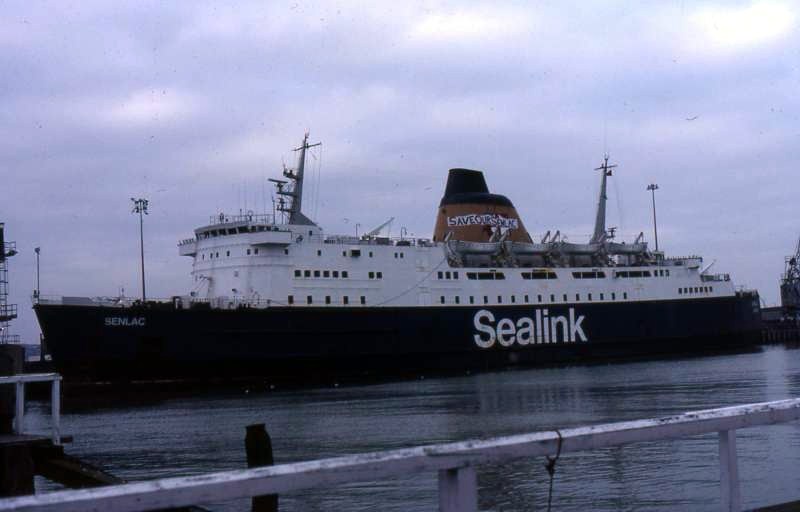
Peter Longhurst Collection
Senlac moored at Newhaven during the occupation of ship by it's crew in January 1982
Railway accident on British Railways
Southern Region
Central Division
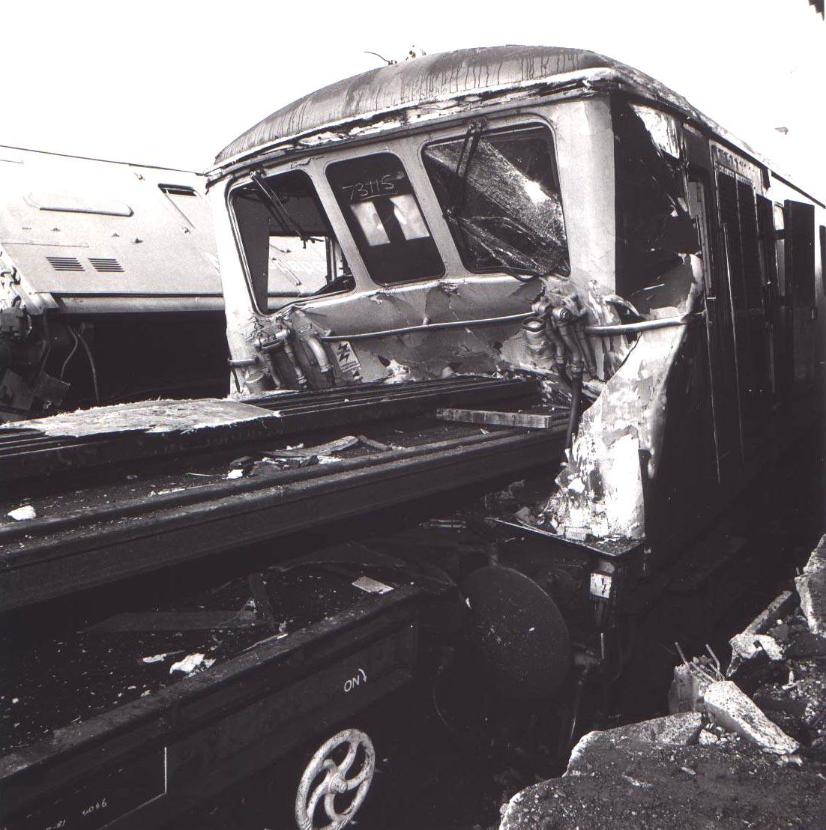
SETTING THE SEEN OF THE EVENTS OF A.S.L.E.&F.’S INDUSTRIAL ACTION OF 1982
By Mick Humphrys
A.S.L.E.&F.’s industrial action actually began in January and February with a series of one-day strikes on Sundays, Tuesdays, and Thursdays, resulting in 17 days of stoppage in total, culminating in an indefinite strike being called at 00:01 on Sunday 4 July which ended at 23:59 on Sunday 18 July.
The primary reason for the industrial dispute was the British Railways Board’s insistence on the introduction of ‘flexible rosters’ with a day length of seven to nine hours, resulting in the abolition of the 8 hour day. The 8 hour day – which J.R. Raynes describes, in Engines and Men, his history of A.S.L.E.&F., as ‘the Society’s crowning achievement’ – was achieved in 1919 with the British Board of Trade after much struggle with the private railway companies which had scant regard for the working conditions of their employees.
The road to the dispute started with the 1980 pay settlement and the promise of a one-hour reduction in the working week. How this 39 hour week was to be implemented was not agreed at the time. Flexible rostering was number two on a list of 19 items the B.R.B. prepared at the time to be discussed – I stress, discussed, not agreed – on productivity. Further items included an easing of our manning agreement and the introduction of the train man concept.
With the May 1981 pay claim the B.R.B. offered 7% which was rejected. A hearing with Lord McCarthy at the Railway Staff National Tribunal found in the union’s favour and instructed an immediate 8% plus 3% payable in November.
That was rejected by the B.R.B., the first time a decision at the R.S.N.T. had ever been rejected by one of the parties involved. A.S.L.E.&F., in response, threatened strike action and in August took the dispute to A.C.A.S. where a settlement was reached on the 8% being paid plus 3% in January 1982, backdated to November 1981.
In a totally separate agreement at A.C.A.S. it was agreed that A.S.L.E.&F. would discuss certain aspects of productivity, flexible rostering being one. It should be stressed that it was ‘agreed to discuss’, with no commitment made to ‘reach agreement’.
But in late December 1981 as the B.R.B. had made no progress with A.S.L.E.&F. on flexible rostering they informed us that they were not prepared to honour the 3% pay increase outstanding from the pay claim. That led to the strikes in January and February after which the B.R.B. settled. It was agreed to take the B.R.B. claim for flexible rostering back to the R.S.N.T. which, unsurprisingly, resulted in a finding in the board’s favour.
A.S.L.E.&F. rejected this decision, stating that the rostering proposals were unworkable. The B.R.B. decided to implement flexible rosters at selected depots in the hope that they could divide the union and pick off the depots one by one. When the executive committee was informed of these plans they immediately called for the indefinite stoppage, which began on Sunday 4 July.
There was a smear campaign against train drivers, this union, and the labour movement in the Tory press and an increasingly hostile B.R.B. began dancing to the tune of the Thatcher government which saw this as a chance to begin its attack on the trade unions.
The B.R.B. sank to the lowest depths during its pitiful negotiations when, on Thursday 15th July, encouraged by Thatcher and her cronies, it stated its intention to close the entire railway network from 00:01 on Wednesday 20 July and to formally dismiss all employees still taking strike action. In response the Trades Union Congress meet with A.S.L.E.&F. and the other rail unions on Friday 16 and Saturday 17 July and, despite expressing ‘grave concern’ at the threat of dismissal as the ‘most serious departure from industrial relations practices by a public corporation’, failed to offer A.S.L.E.&F. and us, the strikers, any meaningful or constructive support. The T.U.C. went on to recommend that the B.R.B. withdraw its intention to close the railway network and dismiss every employee after which the E.C. instructed members to return to work accepting the implementation of provisional flexible rosters.
The failure of the T.U.C. to support a trade union and its members taking legitimate industrial action, and threatened with dismissal, emboldened Thatcher and the Conservative government to take on the whole trade union movement – the miners were next, in the strike of 1984-85 – bringing in draconian anti-union laws which remain in place to this day.
In the aftermath of the strike, the once harmonious and pleasant atmosphere in mess rooms could quickly change with a negative attitude towards colleagues who, for their own selfish reasons, had not supported the strike; sometimes verbally but, more often than not, with silence. Many such ‘colleagues’ had worked excessive overtime during the period.
On the whole, however, the strike call and industrial action were fully supported by the vast majority of the A.S.L.E.&F. membership, uniting young and old. As for management, flexible rosters did not produce anywhere near the improvement in productivity they had hoped but, at many depots, there was an erosion of the quality of diagrams and work content.
This rostering ‘blueprint’ did, though, come to be the rostering format going forward and is still used by many companies to this day.
This article was extracted and adapted from the Locomotive Journal, July 2022
Mick Humphrys, a second man (driver’s assistant) at Euston during the 1982 strike, has compiled a 32 page booklet about the dispute with the help of
Paul Edwards, the late Phil Plaine of Brighton branch & Cliff Holloway off Stratford R.M.S.
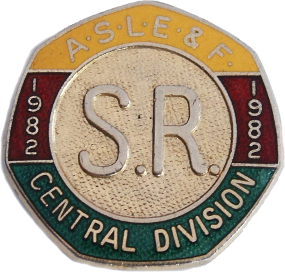
Extracted and adapted from
Tunbridge Wells Meeting
Sunday 21st February 1982, 10.15 a.m.
at the Welfare Rooms Tunbridge Wells Central Station
VIC RUMLEY
The Secretary then informed the members present that there were 4 members at this depot with 20 years service but three were not in attendance at this meeting, only Bro. M. Allen. The Secretary then asked our Honourable Member, Bro. Vic Rumley to congratulate our member on his long service with the Union.
Bro. V. Rumley did mention before handing over the presentation badge that he would thank Bro. M. Allen for all the good and hard work put in, not only as L.D.C. Secretary now but as a Branch Secretary of the past, also the loyalty put into the depot, for whatever he does. This was agreed by all.
In return Bro. M. Allen was asked to present Bro. V. Rumley with a 1982 Diary and a Honourable Membership Card and made it known that he was welcome at anytime to come to Branch meetings and join in the debates. This was agreed by all.
LOCOMOTIVE JOURNAL
APRIL 1982
SELHURST
BUSY MEETINGS
The AGM was held in December and all Officers were once again elected without change. Votes of thanks were recorded for the Secretary Bob Black formerly of Coatsbridge in Scotland and Chairman Mr. E. Streeter Branch finances were in good order as very ably presented by our Treasurer.
Special mention was made of the collection of late Bro. H. Rennie. total collected £2,596. this Branch through the medium of the Journal would like to express on behalf of Mrs. Rennie and all the members our very many thanks to all branches for their donations.
January Branch meetings were held on the first full strike days and were well attended. The priority was the strike call. Lengthy discussion took place and a resolution was sent with unman. votes fully backing the decisions of the EC and giving a further reminder that our conditions of service must not be sold.
Special discussion took place about media coverage and the way they have reported this strike call. Members were disgusted and saddened by it all. One comment was made that if we were to change our name to “Solidarity” perhaps we would get a fair unbiased hearing by the press media.
Member expressed thanks to Bro. Dave Smith who has retired from Selhurst depot LDC and best of luck to Bro. M. Saville who has been elected unopposed to hi position.
The next few months are going to be difficult and trying but if we stick solidly behind our Gen. Sec. and EC we will win the fight to protect our conditions.
M. SAVILLE
BRANCH REPORTER
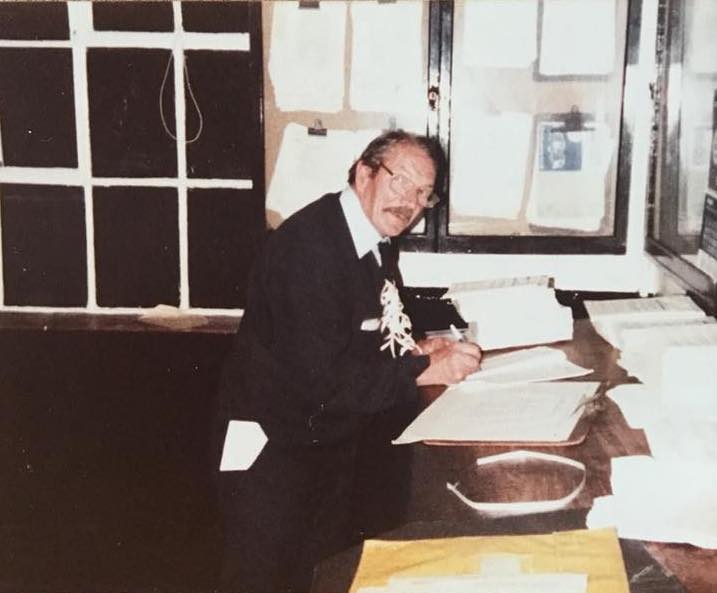
GRAHAM COURT COLLECTION
Eastbourne Driver Harry Whitlock's day before his retirement 1982
LOCOMOTIVE JOURNAL
APRIL 1982
BRIGHTON 1 & 2
SPECIAL JOINT MEETING
At a special meeting called for the Brighton (1) and (2) branches, and attended by Bros. D. Fullick, EC President and District Secretary Neil Milligan, on Thursday, February 18 we were fortunate to get first hand details of the settlement of our dispute, which had been signed that day, also a good report from Derrick and Neil on principles involved. And at the conclusion of this well attended meeting the following resolution was adopted unanimously.
“That a vote of thanks be extended to our General Secretary Ray Buckton, his fellow officers and the EC for their firm stand against those at BR Board level, the media and others in their unsuccessful effort to destroy us as a Trade Union.
Our thanks also to the Head Office staff who must have worked hard and long to keep us informed of the up to date position. We also extend our thanks to those in the N.U.R. and T.S.S.A. and in fact to all people in the Labour and Trade Union Movement, including Mr. Les Huckfield, MP, who have given us their support.
We further call upon our EC to stand firm on the eight hour day agreement.”
Praise was extended to our younger members who had perhaps been involve in industrial action for the first time, and had grasped the issue and shown solidarity with the older fraternity of our Society in a victory which will be remembered by a lot of people for a long time to come. Well done, all
P.H. PLAINE
CHAIRMAN
BRIGHTON (2)
LOCOMOTIVE JOURNAL
APRIL 1982
THANKS
On behalf of all the members who attended the National School at Dorking March 1 - 6, 1982, may I thank everyone involved, especially the guest speakers who included Ray Buckton, Derrick Fullick, Les Huckfield MP ad many others.
We all found it educational and very enjoyable.
J.A. NORRIS
ASS. BRANCH SECRETARY
TUNBRIDGE WELLS
Extracted and adapted from
Ore Branch Meeting
May 23rd 1982
In the L.D.C. report which followed the loss of work at Ore since 1968 was discussed. Bro. S. Tingley L.D.C. Secretary outlined what had taken place since then, equalisation of mileage etc and non co-operation of Sectional Council to put more work at coastal Depots.
The proposed closure of Ore Depot was brought up, nothing definite at present. The L.D.C. had already listed many items with which to fight the case if the need arose.
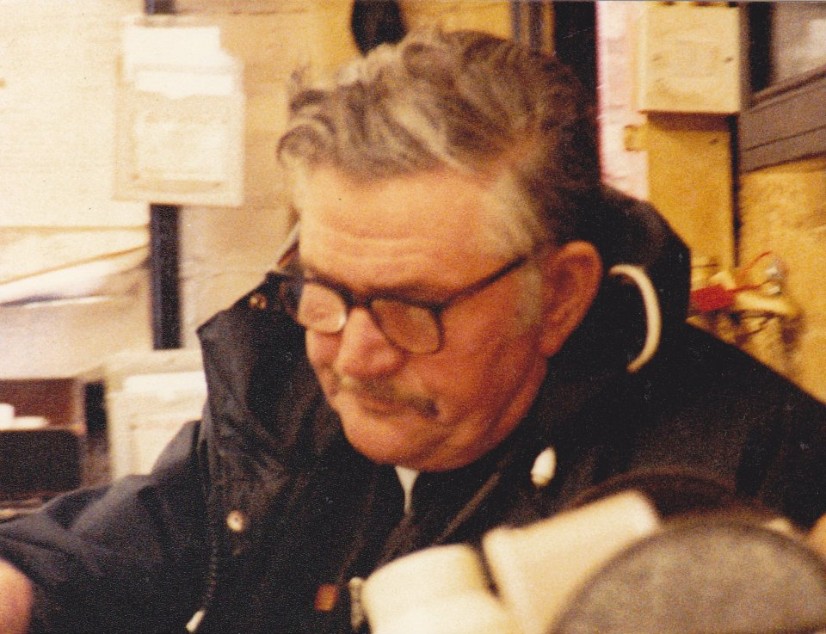
RODNEY BURSTOW COLLECTION
Littlehampton Driver Gordon Knight
Gordon Knight's father was a driver at Three Bridges many years ago although I did fire to him once on loan from Horsham, he was my mothers brother, my uncle so Gordon was my cousin, he was known as "Captain birds eye" I think because he had a boat, but that's a story for another day!!!
Gordon was the Motorman who is featured in the original film of the fast run between London Victoria to Brighton
Informatiom courtsey of Rodney Burstow
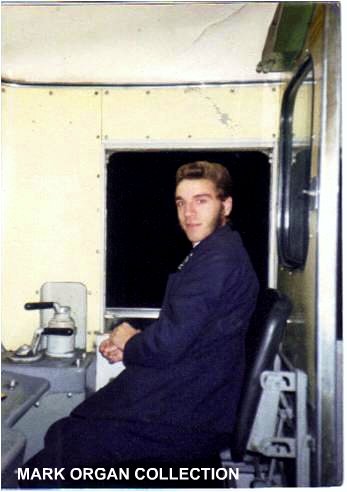
Brighton Secondman Mark Organ
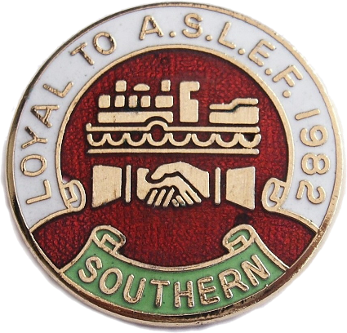
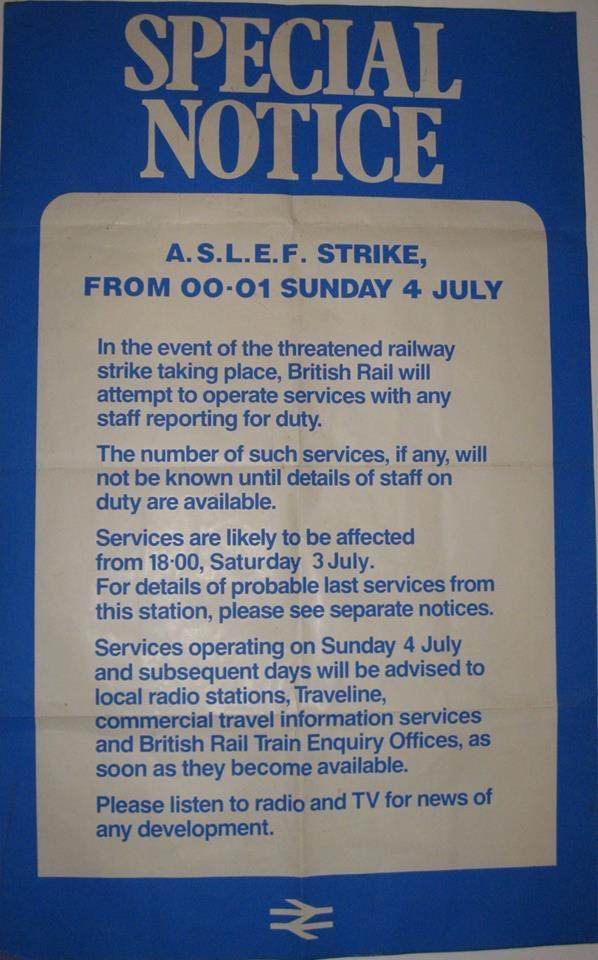
LOCOMOTIVE JOURNAL
OCTOBER 1982
THE PAINFUL REALITY OF FLEXI ROSTERS
Like most drivers, I face the painful reality that in short term at least we must face the prospect of variable rostering.
The problems that most depots have experienced are gigantic, and they will remain unsolved, because flexible rostering as proposed by the BRB is totally impracticable.
At my home depot, Three Bridges, the attempt is being made to eliminate many of the problems of flexible rostering trying to incorporate the principles of the guaranteed eight hour day into the guaranteed thirty nine hour week.
Basically this manifests itself in an attempt to link every week’s work to thirty nine hours rostered work or less; using the system of third nine hours work for thirty nine hours pay, you maintain the principle of keeping your guaranteed pay linked to the same amount of rostered work; also once you exceed thirty nine hours work in any week you must receive overtime pay at the enhanced rate.
Using this system you have no link structure problems, no depot establishment worries, drivers will be able to change turns for the week with no difficulties, and so on.
After all I see no reason why footplate staff should have to b in a position of having to work up to forty four hours per week for only nine hours pay. Why were traincrews the only members of BR staff to earn their extra rest day through increased productivity?
As far as I’m concerned, management only guarantee us a thirty nine hour week pay. We in return should only guarantee them thirty nine hours work.
In conclusion, this system won’t eliminate all our problems, but it should at least help to take the sting out of the tail of flexible rostering and make our lives slightly more acceptable.
DEREK ABRAHAMS
THREE BRIDGES
Extracted and adapted from
Ore Branch Meeting
November 28th 1982
A lengthy debate followed after this on the question of the proposed depot closure which was to be May 1984. The question of petrol allowance, staff trains, removals etc were all brought up. The L.D.C. confirmed that their main priority was to keep the depot open. The question of approaching St. Leonards Depot L.D.C./Branch Secretary over our joint problem was discussed. The electrification from Hastings - Tonbridge was still on the cards in the not too distant future.
LOCOMOTIVE JOURNAL
NOVEMBER 1982
EC FINES BLACKLEGS
The Executive Committee has decided to fine strike brokers £10 for every day they worked during the recent national dispute.
The decision was taken after lengthy consultations with the Society's solicitors, Robin Thompson and Partner. A second opinion was sought from the TUC’s solicitors, Russell Jones and Walker, who broadly confirmed the advice given by Robin Thompsons
Branches were informed of this decision in Head Office Circular 213/19832, date November 17.
LOCOMOTIVE JOURNAL
DECEMBER 1982
CAUSE FOR ANGER
I would like to vent my anger at Executive Committee Decision No. 1659/338. Like the vast majority of A.S.L.E.F. members I supported the union 100 per cent during our 31 days of dispute this year. Now five months later, I find these scabs or traitors to our cause are being let off by being fined £10 per day worked.
Why £10? Why not £50 or £100 a day? - anything other than this paltry figure.
They will laugh and laugh loud at this punishment, and at all who supported the union and lost between £500 and £800 overall. They have no financial trouble after working all the hours they could grab. There are instances where some scabs worked up to sixteen hours a day, seven days a week. They did mileage, they came back to work after less than ten hours of rest.
This decision must rank as one of the worst made by our EC. It angers me a great deal to think of what they did, and they are getting off so lightly. Finally, to those who supported the strike and now speak to the scabs - you have very short memories.
A.W. RICKETTS
BRANCH SECRETARY
BRIGHTON No.2